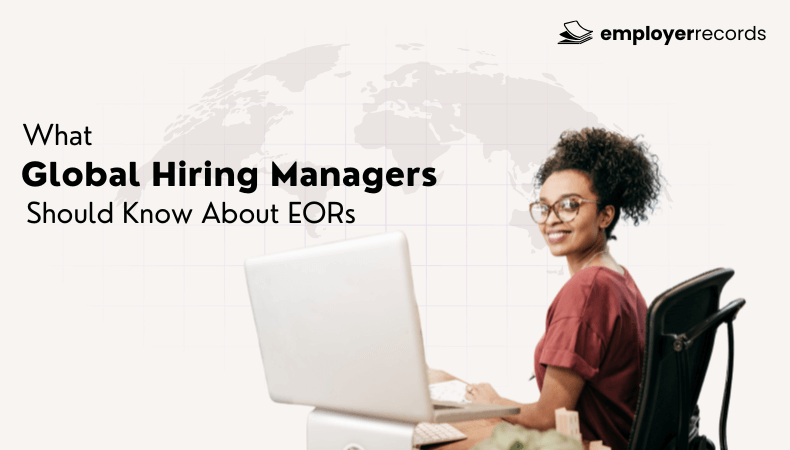As companies expand internationally, they face a double-edged sword: massive growth opportunities and a thicket of complex local laws. From labor codes to payroll regulations, navigating compliance across borders can feel overwhelming. That’s where an Employer of Record (EOR) steps in, simplifying global hiring while reducing legal risk.
An EOR acts as a legal employer on your behalf in foreign jurisdictions, managing everything from employment contracts and benefits to statutory taxes and filings.
With an EOR, companies can expand quickly into new countries, often in a matter of days, without the cost, time, or legal burden of setting up a local entity.
More importantly, EORs help businesses fully comply with local laws, reducing the chance of costly mistakes or penalties.
In this guide, we’ll explore how EORs ensure local compliance, reduce legal exposure, and empower organizations to confidently scale globally.
What Is An EOR?
An Employer of Record (EOR) is a third-party organization that legally employs workers on behalf of another company. While your business oversees the day-to-day tasks and performance of the employees, the EOR assumes responsibility for all formal employment duties.
This includes managing employment contracts, processing payroll, handling tax withholdings, administering benefits, and ensuring compliance with local labor laws and regulations.
EOR is the bridge between your company and the complexities of foreign employment law. By partnering with an EOR, businesses can hire international talent without the need to establish a legal entity in each country.
This arrangement allows companies to expand their global workforce efficiently and compliantly, mitigating the risks associated with international employment.
Think of an EOR as your outsourced HR, legal, and payroll department rolled into one, specifically designed for international markets.
The Importance Of Local Compliance
Expanding into international markets offers significant growth opportunities, but it also introduces a complex web of local employment laws and regulations.
Each country has its unique legal landscape governing labor practices, tax obligations, employee benefits, and data protection. Failing to adhere to these local laws can lead to severe consequences, including:
Legal Penalties And Fines
Non-compliance with local employment laws can lead to significant legal penalties. For instance, in Japan, employers who hire foreign nationals without the appropriate work visas may face fines of up to JPY 3 million or imprisonment for up to three years, or both.
These strict penalties underscore the importance of adhering to local labor and immigration laws to avoid severe consequences.
Employment Lawsuits
Improper handling of employment matters, such as contracts, terminations, or benefits, can expose companies to legal disputes. Wrongful termination claims, for example, may arise when an employee is dismissed in violation of employment laws or contractual agreements.
Such lawsuits can result in substantial financial liabilities, including compensation for lost wages and damages.
Reputational Damage
Non-compliance incidents can severely damage a company’s reputation. News of legal violations or unethical practices can erode public trust, deter potential customers, and make it challenging to attract and retain talent.
In today’s interconnected world, reputational damage can spread rapidly, leading to long-term negative impacts on business relationships and market position.
Operational Disruptions
Regulatory breaches can lead to operational disruptions, such as business shutdowns, increased scrutiny from authorities, and more frequent audits.
These disruptions can hinder day-to-day operations, divert resources, and delay strategic initiatives. In severe cases, non-compliance can threaten the overall stability and continuity of business operations.
Whether it’s ensuring proper contract structures in Germany, adhering to mandatory social security contributions in Brazil, or complying with data protection laws like the GDPR in Europe, local compliance is not optional; it’s essential.
Partnering with an Employer of Record (EOR) can help navigate these complexities, ensuring that your international operations remain compliant with local laws and regulations.
How EORs Ensure Compliance
Here’s how a trusted EOR simplifies and guarantees local compliance:
Legal Entity Coverage
Establishing a legal entity in a foreign country can be time-consuming and costly. An EOR already possesses legal entities in various countries, allowing your business to hire employees internationally without setting up a local branch.
This arrangement enables rapid market entry and ensures adherence to local employment laws.
Localized Employment Contracts
Employment laws vary significantly across countries. An EOR provides employment contracts tailored to the specific legal requirements of each country, including language, mandatory clauses, and statutory benefits. This ensures that all contracts are compliant and enforceable under local laws.
Tax Withholding & Remittance
Managing payroll taxes in multiple jurisdictions can be complex. An EOR handles the accurate calculation, withholding, and remittance of taxes in compliance with local regulations. This reduces the risk of penalties and ensures timely tax submissions.
Labor Law Monitoring
Employment regulations are subject to change. An EOR continuously monitors updates to labor laws in each country and adjusts employment practices accordingly. This proactive approach helps maintain compliance and mitigates legal risks.
Seamless Onboarding
Onboarding processes differ globally, encompassing various legal and cultural considerations. An EOR manages the onboarding process in line with country-specific requirements, ensuring that all necessary documentation and procedures are correctly handled.
This facilitates a smooth integration of new employees into your organization.
Key Compliance Areas Managed By EORs
Navigating the intricate landscape of international employment laws can be daunting for businesses expanding globally.
An Employer of Record (EOR) serves as a strategic partner, adeptly managing critical compliance areas to ensure seamless and lawful operations across borders.
From handling employment contracts to overseeing tax obligations, EORs take on the complexities of local regulations, allowing companies to focus on their core objectives.
Below is a breakdown of the key compliance areas expertly managed by EORs:
| Compliance Area | How EORs Help |
| Employment Contracts | Draft and manage contracts that comply with local labor laws and standards. |
| Tax Compliance | Calculate, withhold, and remit taxes in accordance with local regulations. |
| Benefits Administration | Ensure statutory benefits like health insurance and retirement plans are provided. |
| Work Permits & Visas | Handle the process of obtaining necessary work authorizations for employees. |
| Termination Protocols | Manage employee offboarding in line with local legal requirements. |
Benefits Of Partnering With An EOR
Partnering with an Employer of Record (EOR) offers businesses a strategic advantage when expanding into new markets. By handling complex legal and administrative tasks, EORs enable companies to focus on their core operations while ensuring compliance with local employment laws.
From streamlining onboarding processes to managing payroll and benefits, EORs provide comprehensive support that facilitates seamless international growth.
- Risk Mitigation: EORs ensure compliance with local laws, reducing legal risks and potential financial penalties.
- Faster Market Entry: EORs enable rapid hiring in new markets, bypassing the need to establish local entities.
- Cost Efficiency: Avoids expenses of setting up foreign subsidiaries, saving on legal, administrative, and operational costs.
- HR Streamlining: Consolidates payroll, contracts, and compliance processes into a unified platform, enhancing operational efficiency.
- Scalability: EORs provide flexible solutions, allowing businesses to scale their workforce up or down as needed.
When Should You Consider Using An EOR?
Expanding your business internationally or managing a distributed workforce introduces a myriad of complexities, from navigating diverse employment laws to handling intricate payroll systems.
An Employer of Record (EOR) can be an invaluable partner in these scenarios, offering expertise and infrastructure to ensure compliance and efficiency.
Whether you’re entering new markets, hiring remote talent, or seeking to streamline HR operations, understanding when to leverage an EOR is crucial for sustainable growth.
- An EOR enables swift market entry by hiring local employees without establishing a legal entity, minimizing initial investment risks.
- An EOR facilitates compliant hiring of international remote workers, managing local employment laws, payroll, and benefits on your behalf.
- An EOR provides the necessary legal and HR support to manage international employees, ensuring compliance and reducing administrative burdens.
- An EOR allows rapid global expansion by handling employment logistics, enabling you to onboard international talent quickly and efficiently.
Conclusion
Expanding globally offers significant growth opportunities but also introduces complex legal and compliance challenges. Partnering with an Employer of Record (EOR) provides a strategic solution, ensuring that international hires are legally employed, compensated accurately, and managed under local labor laws.
EORs handle critical administrative functions, such as payroll, tax compliance, benefits administration, and regulatory adherence, allowing businesses to focus on their core operations while mitigating legal risks.
This approach not only accelerates market entry but also reduces the costs and complexities associated with establishing legal entities in multiple countries.
For fast-growing companies aiming to scale efficiently and compliantly, leveraging EOR services is a prudent strategy to navigate the intricacies of international employment and achieve sustainable global expansion.






